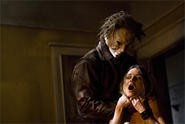This week Zombie's lifelong passion for horror films culminates with the release of Halloween, his remake of John Carpenter's 1978 classic.
Quick -- name every rock star who made the leap to directing blockbuster motion pictures. Can't think of any?
Neither can we. That's why Scene sat down with the heavily tattooed horror master at the Four Seasons Hotel in Beverly Hills, California. There, we discussed why Zombie agreed to remake a movie dear to his heart (an act some have called sacrilege) and how his musical career turned him into one of Hollywood's most daring directors.
Scene: What's your relationship to the original Halloween? You're a notorious fan of horror, but how does Halloween rank in your life?
Zombie: One of the questions I always get is "What are your top five horror movies?" I always say Halloween. I always loved it and thought it was one of the best horror movies. So yeah, it's special to me.
How did you react when producer Bob Weinstein first approached you about Halloween?
I didn't know what to say. I had never thought about it before. They weren't necessarily proposing a remake to me. They were just proposing Halloween. You know, like, "What do you think?" And I was like, "I don't know. It's a great movie. That's what I think." So I didn't know what to tell them except, "That's cool. Thanks for the offer. I'm going to go away and think about it, and see what I can come up with."
I realized the only way I was interested in doing it was if it was essentially a remake. I wasn't going to do a Halloween 9. That would be silly. A prequel -- I didn't know if that was something I'd want to do either. And that's when I thought, "A remake with an hour's worth of backstory we've never seen before." I went back and pitched that -- a young Michael and an older asylum Michael -- to bring my own stamp to this.
Nowadays, do you consider yourself a filmmaker who moonlights as a musician, or are you still a rocker who just so happens to make movies?
It's 50/50. When I was doing Halloween, it was 100 percent Halloween. Now it's done, so I'll go back on tour. For me, being a musician is now less about the workload part of it. It's about relaxing, whereas filmmaking is much more intense.
Can you think of other musicians who made the jump to directing mainstream motion pictures?
I can't think of anybody. But even like 10 years ago, I was the first artist on MTV to win an award for directing his own video. It's because it's a weird job. A lot of musicians become actors. It seems like a logical decision, since they're both performing. But directing is such a different thing. Some people think they might want to do it, but the reality of what it is, is not something they want to do. It's an insane amount of work, and it's not glamorous.
That being said, why did you become a director?
I was so odd in the other field. I've never been the typical anything, even when I was doing music -- then and now -- and everybody's main concern seemed to be how fucked up they could get. I was just never like that. I was about the creative process and creating things -- creating the albums and the artwork and the stage shows and the T-shirts. It was the process that got me jazzed up, not how much I could destroy myself.
Did your music career prepare you for directing, and if so, how?
I think so. By being signed to a major label for whatever it is now, 17 years, I'm used to the idea of putting all your artistic integrity into a product. But you know it's a product. It has to sell, and if it doesn't sell, you will get dropped from the label. That's why it's called the music business. That's the reality of life that I'm very happy to deal with. A&R people, agents, and managers -- I'm just so used to them. It's a necessary thing. But then you get these film-school students, who come from a completely different point of view and get thrown into that and are like, "Whoa, evil ugly side of it all!"
Like making music videos -- I get hired to make a music video for Ozzy. "Here's $300,000, and we need the video delivered in seven days." There's no excuses after seven days, why it's not good or why it's not delivered. Nobody fucking wants to hear about it. You signed a contract to deliver that thing, and it better be fucking good. That's a weird way to work, but that's how movies work too. You take their money. You sign that contract. Here's your schedule, and when you get to the fucking end of that fucking schedule, you better fucking have a good fucking movie they can release. Good or bad, it's the reality of the business.












